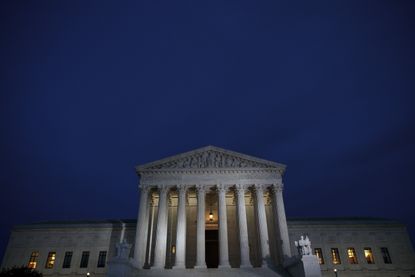

Celebrity news, beauty, fashion advice, and fascinating features, delivered straight to your inbox!
Thank you for signing up to . You will receive a verification email shortly.
There was a problem. Please refresh the page and try again.
With its stunning ruling Friday morning, the Supreme Court not only struck down Roe v. Wade—a precedent many believed until recently to be "settled law"—but also opened the door to reversals of other progressive decisions by the court. Specifically, Americans' rights to same-sex intimacy, marriage equality, and contraception. These rights were specifically called out by Justice Clarence Thomas, who argued in a concurring opinion with Friday's ruling that such rights should be "reconsidered." He added that the Supreme Court had a "duty" to do so.
Thomas wrote: "In future cases, we should reconsider all of this Court’s substantive due process precedents, including Griswold, Lawrence, and Obergefell. Because any substantive due process decision is 'demonstrably erroneous'...we have a duty to 'correct the error' established in those precedents."
These are the cases he's talking about:
- Griswold v. Connecticut: The 1965 case that determined that people had a constitutional right to obtain contraceptives
- Lawrence v. Texas: The 2003 case that determined that people had a constitutional right to engage in same-sex sexual relations
- Obergefell v. Hodges: The 2015 case that determined that people had a constitutional right to marriage equality
Justice Thomas added: "After overruling these demonstrably erroneous decisions, the question would remain whether other constitutional provisions guarantee the myriad rights that our substantive due process cases have generated. For example, we could consider whether any of the rights announced in this Court’s substantive due process cases are 'privileges or immunities of citizens of the United States' protected by the Fourteenth Amendment."
He concluded: "To answer that question, we would need to decide important antecedent questions, including whether the Privileges or Immunities Clause protects any rights that are not enumerated in the Constitution and, if so, how to identify those rights...That said, even if the Clause does protect unenumerated rights, the Court conclusively demonstrates that abortion is not one of them under any plausible interpretive approach."
The Due Process clause is the American right to due process before rights are taken away. Thomas is arguing that any rights not specifically in the Constitution could now be unraveled by the Court.
After the draft of the decision leaked in May, President Biden noted that the ruling could have a domino effect. "If the rationale of the decision as released were to be sustained, a whole range of rights are in question. A whole range of rights. And the idea [that] we’re letting the states make those decisions, localities make those decisions, would be a fundamental shift in what we’ve done.”

Jenny is the Director of Content Strategy at Marie Claire. Originally from London, she moved to New York in 2012 to attend the Columbia Graduate School of Journalism and never left. Prior to Marie Claire, she spent five years at Bustle building out its news and politics coverage. She loves, in order: her dog, goldfish crackers, and arguing about why umbrellas are fundamentally useless.
-
 The Queen Has Eaten This Food Every Day for the Past 91 Years
The Queen Has Eaten This Food Every Day for the Past 91 YearsNow that’s commitment!
By Rachel Burchfield
-
 Kate Middleton Altered Her Engagement Ring to “Avoid Her Worst Nightmare”
Kate Middleton Altered Her Engagement Ring to “Avoid Her Worst Nightmare”The ring was actually originally supposed to have been worn not by Prince William’s wife, but by Prince Harry’s (!).
By Rachel Burchfield
-
 Princess Diana Saw a Much Different Future for the Relationship Between Brothers Prince William and Prince Harry
Princess Diana Saw a Much Different Future for the Relationship Between Brothers Prince William and Prince HarryHow would she react to their feud if she were alive today?
By Rachel Burchfield


